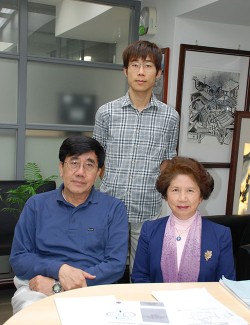 Left to right:Dr. John Yu, Doctoral student Hsin-Hung Lin and Dr. Alice Yu Doctoral student Hsin-Hung Lin of Dr. Alice Yu’s lab has been invited, along with other 5 participants from Academia Sinica, to attend the 2013 HOPE meeting.
Left to right:Dr. John Yu, Doctoral student Hsin-Hung Lin and Dr. Alice Yu Doctoral student Hsin-Hung Lin of Dr. Alice Yu’s lab has been invited, along with other 5 participants from Academia Sinica, to attend the 2013 HOPE meeting.
In Lin’s study co-led by Dr. Alice Yu and Dr. John Yu, a novel protein, designated as YULINK, has been proved to be involved in the venous specification. A demonstration has been made showing how YULINK regulates venous vascular tube formation through VEGFR2-mediated endocytosis in zebra fish as well as human endothelial cells. Lin will present this study in the coming event.
HOPE Meetings with Nobel Laureates is an annual event sponsored by Japan Society for the Promotion of Science (JSPS) since 2007. This event is designed to give opportunities to excellent graduate students and young researchers selected from countries and areas in the Asia-Pacific region to engage in interdisciplinary discussions with Nobel laureates and other distinguished scientists pioneering the frontiers of knowledge.
Invited participants for the 2013 event are from countries including Australia, Bangladesh, China, Egypt, India, Indonesia, Israel, Japan, Korea, Malaysia, Mongolia, New Zealand, Philippines, Singapore, South Africa, Taiwan, Thailand, and Vietnam.
For more information, please see: http://www.jsps.go.jp/english/e-hope/outline.html